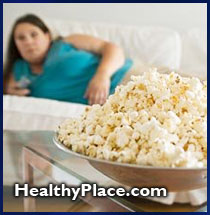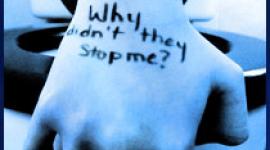Preparation: Are You an Overeater?
Part 2: Preparation
Are You An Overeater? A Check List.
 Your doctor, friends, family, nutritionist and calorie tables may describe your eating as too much, too little or strange. They may describe it as healthy and within reasonable limits. Only you know the details of your eating habits and the influence food has in your life.
Your doctor, friends, family, nutritionist and calorie tables may describe your eating as too much, too little or strange. They may describe it as healthy and within reasonable limits. Only you know the details of your eating habits and the influence food has in your life.
Do any of these food related statements describe your experience?
- I eat meal portions larger than necessary.
- I eat privately before eating publicly to disguise how much I eat.
- I'm a "grazer," eating throughout the day and evening.
- I eat alone after being with friends or coworkers.
- I crowd my mind with thoughts about food.
- I starve myself for hours or days to create guilt free eating time.
- I binge. (Classically binge eating involves massive eating in a short period of time. But while a quart of ice cream may be a binge to one person a small dish may be a binge to another. If you think or feel you binge, that self defined binge behavior is something to explore.)
- I vomit or use laxatives to ride myself of food I've eaten.
- I exercise regularly and specifically to burn up calories from what I think is too much food.
- I have some private rituals regarding certain foods.
The thread which runs through these behaviors is that you are eating for reasons other than food hunger. In addition, if eating ranks among the most satisfying emotional or stress reducing experiences in your life, you may be living with too many unsatisfying relationships with people.
Why you live this way may be a secret even from you. Understanding the link between your undesirable eating habits and neglected aspects of your personal life can help free you from overeating.
Personal Rewards in Freedom From Food Tyranny
Your journey to freedom from overeating is not easy. Looking at the rewards you will reap can help sustain you when the going gets tough. As your emotional dependency on food diminishes you will discover these changes in your life.
- You improve relationships.
- You are more sensitive and attentive to yourself and others.
- You enjoy others more and they enjoy you.
- You become physically more attractive.
- For example:
- Swollen glands shrink.
- Glazed eyes become clear and alert.
- Hair develops a healthy sheen.
- Physical movements become more coordinated and graceful.
- For example:
- You may be safer.
- You reduce or end your late night trips to grocery stores or fast food places which may put you in a vulnerable position.
- You reduce the chances of being in car accidents, from fender benders to major accidents. Such accidents can result when you, the driver, are distracted by food thoughts or by bingeing in the car.
- You have more time for people and activities when you use the energy you previously put into food and eating toward something else.
- You are more creative and productive.
- You are able to think more clearly.
- You have more energy for projects you may have considered unreachable dreams.
- You save money. You spend less on food.
- Emotionally you have more experiences of self-confidence, peace and joy.
- You feel more alive.
The Dilemma in Recovery
The dilemma in your recovery process is that eventually, healing and triumph require that you face secrets in yourself.
Despite the benefits in freedom, overeating is difficult to stop. You are using food to stop or prevent yourself from feeling uncomfortable or painful emotions. Your eating patterns are a solution to difficult emotional experience.
- You may be eating for protection from loneliness and self doubt.
- You may be hiding from your own anger.
- You may feel eating protects you from danger.
Often you don't even know this. What you do know is that you feel uncomfortable, nervous, irritable and frightened when you try to stop overeating.
These feelings signal that you have secrets from yourself.
Your dilemma is that you can change your eating patterns permanently only if you face and resolve your secrets.
If you follow any reasonable diet regime you will lose or gain weight, depending on your goal.
However, since diets address behavior alone they strip you of your protection from your own secrets. No alternative protection is given. As you eat more appropriately your anxiety can grow until it is unbearable.
With feelings of false power and superiority, or shame, guilt and relief, you return to the food solution.
Addressing the unknown in yourself is the heart of any useful method to stop overeating.
If your overeating is a short term and mild problem, you can address it with this guide and patient friends. If it is a long term or life interfering situation, you will need to include additional forms of help.
Preparation for the End of Overeating
Like preparing for any journey, you will need some equipment. In your case the equipment, while intangible, is essential in coping with challenges along the way. Similar to other journeys, you will gain expertise with your equipment and discover new and useful applications by continued practice.
Essential Equipment List
- 1. Honesty.
- You will need honesty. Willingness to be honest with yourself clarifies your position, gives you more opportunities of choice and opens your eyes and heart to realistic solutions. The more honest thought you give to your overeating the more opportunity you give yourself to be free.
Being honest, you will recognize that your unwanted eating patterns serve to numb your feelings and help you hide from living. The sense of danger which occurs when you do not overeat feels greater than the suffering you experience because you are overeating. By following the workbook exercises you will develop the courage you need to dare to face the fears which accompany a life of not overeating.
- 2. Fully accepting that you don't know all the answers.
- When you know you don't know something, you know something. You become open, curious and more able to learn.
- Overeaters usually know what conditions contribute to their overeating. For example, they may be familiar with a usual pattern like eating all the leftovers after a party, or overeating when getting home from work or school when they know they are going to be alone. But they don't really know why they are doing this.
- Once you know your undesirable food behavior relates to an attempt to help yourself, you can begin to help yourself in new ways. You are at the point of starting your triumphant journey.
- 3. Increased self-awareness.
- Self-awareness is also part of your equipment. As you become more aware of your emotional states during the times you are vulnerable to overeating, you can discover clues about your inner secrets.
- 4. A willingness to learn to recognize limits.
- Part of honesty and self awareness is the ability to recognize limits. When you recognize the limits of what you know or can do for yourself, you may feel anxious. Learning to tolerate this and be willing to learn something new helps you discover new opportunities.
- 5. A willingness to learn to allow other people to help.
Over time, with practice and growing strength, you can develop this discriminating acceptance of others. But for beginning your journey, all you need is the willingness to try.
- 6. Appreciation of realistic time.
- Overeating numbs you quickly but temporarily. Permanent change takes substantial time to develop. Going from the fast numbing relief of overeating to the gradual development of genuine strength and feeling requires a sense of patience and acceptance of real time.
- 7. Kindness.
- Perhaps the most difficult to use and most essential to carry in your equipment bag is kindness. Sometimes your journey will be arduous and you will be tempted to be severe with yourself. More powerful than any harsh criticism, kindness and gentle encouragement will sustain you. Daily reading out loud of the affirmations in Appendix B can be reinforcing and help you develop this most needed piece of equipment - kindness to yourself.
end of part 2
next: Part Three: Exercises to Stop Overeating: 1 - 10
~ all triumphant journey articles
~ eating disorders library
~ all articles on eating disorders
APA Reference
Staff, H.
(2008, November 25). Preparation: Are You an Overeater?, HealthyPlace. Retrieved
on 2026, March 2 from https://www.healthyplace.com/eating-disorders/articles/preparation


